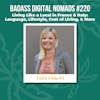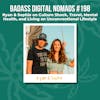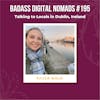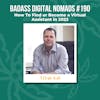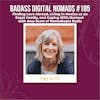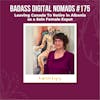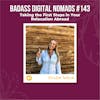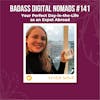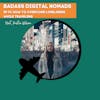8 Ways To Overcome Reverse Culture Shock
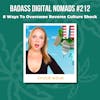
Have you ever felt reverse culture shock coming home after a trip abroad? Or do you feel culture shock in your home country regardless - even if you've never left? If you can relate, Kristin has 8 tips for you to help process and overcome any symptoms of reverse culture shock.
Have you ever felt reverse culture shock coming home after a trip abroad? Or do you feel culture shock in your home country regardless - even if you've never left? If you can relate, Kristin has 8 tips for you to help process and overcome any symptoms of reverse culture shock.
(Note: Audio improves at 2:45)
SPECIAL OFFERS:
- Watch the replay of the Buenos Aires Digital Nomads Conference at www.NomadsBA.com
- Going to Buenos Aires? Make sure to solicit your NomadsBA Welcome Packet.
- Check out The Maverick Show for 200+ interviews with digital nomads and world travelers.
- Listen on Apple Podcasts? Be our 100th Podcast Review!
Recommended Book - The Art of Coming Home: https://amzn.to/3N2huct
YouTube Videos:
- Reverse Culture Shock
- How I See the US After Living Abroad
- Cost of Living in Argentina
- Getting Citizenship in Argentina
- Living in Japan as an American
Connect with Kristin and Support the Show:
See the show notes pages on BadassDigitalNomads.com or TravelingwithKristin.com/podcast for time stamps, transcripts, and more resources from this episode.
Sneak Peek:
Kristin: 00:00:00 It was like you're one person before you leave, and then you're someone else when you get back. But I definitely would not trade this experience for anything.
Introduction: Welcome to Badass Digital Nomads, where we're pushing the boundaries of remote work and travel, all while staying grounded with a little bit of old school philosophy, self-development, and business advice from our guests.
Kristin Wilson, Host: 00:00:32 Hey there, Kristin Wilson from Traveling with Kristin here, and welcome to episode 212 of Badass Digital Nomads. You know, we've talked a lot on the podcast and also on my YouTube channel about the different types of culture shock and also cultural adaptation that you can experience in all different countries, but we've never talked about reverse culture shock, and this is something that a lot of you have asked me to cover on the podcast and on the YouTube channel. So that's what we're doing this week. And actually, I had a lot of fun making this video slash podcast. I've been collecting my thoughts over the past weeks and months and finally put it all together for you. And I also learned a lot as well, uh, not just from my own experience, but looking deeper into what other people have experienced with reverse culture shock and really thinking about what is it, how do you overcome it, and what are some tips to start just coping with it and like feeling normal again, if you're back in your home country after traveling or living abroad.
Kristin: 00:01:50 At the end of this podcast, as we've done with some other YouTube videos that I've published on the podcast here, I'm gonna share some of my favorite comments from this video and there are hundreds of just very thoughtful comments. I wish I could read all of them, but I do recommend heading over to the YouTube version so that uh, you can see some of the graphics and also, uh, read almost 200 comments over there from - from other viewers. There is, however, one comment that I wanna read to you before we get started, and this is from Katie Wright and she really hit the nail on the head because as I was publishing this video, I thought, you know, maybe <laugh>, maybe I didn't cover this exact aspect and enough detail. And Katie talks about how she went through reverse culture shock after spending six months in Germany, but when she came back, she was actually happy to experience it because she was so grateful for how she had changed during that experience of living abroad.
Kristin: 00:02:55 But then here's the kicker, and she says all things said things are pretty bad in the US right now. So if you're having some negative reactions, don't dismiss them automatically. She says the problems in the United States have been building over decades, but we're reaching a critical point. So don't automatically dismiss what you see if you're having a negative reaction, it could be a very healthy reaction resulting from being awakened during your travels. And she does make a good point here because I think making the reverse culture shock video while not being in the US I didn't talk enough about the negative sides of what you see, especially if your home country is the US because the US just has so many problems right now. And I think I'm so grateful and I have such peace of mind for being outside of the US right now, that the problems of the US are not as top of mind as they would be if I were physically in the country right now.
Kristin: 00:04:05 And when I do look at the headlines and, and look at the news and the US, I mean, it's, it's such a situation over there right now and there are so many horrifying problems. There was just another shooting at a music festival, uh, legislative problems like the politics, I mean the cost of living the healthcare system. It's, there's, there is a lot of problems. So as you're listening to this, there is a Bart where I say, you know, maybe it's not as bad as you first think when you get back to your home country after being overseas. But on the other hand, as Katie mentioned, maybe it is that bad. And yeah, maybe it is because Scott, Scott Menor, he also says part of it is that it's genuinely that bad in the US between healthcare and the lack of walkable cities and public transit and yada yada yada.
Kristin: 00:05:01 And uh, Expat Dog Life says, one thing I've learned living outside the country I was born is just how bad it is. <laugh>, I'm so grateful I don't have to live there all the time. I don't know where he lives exactly, but it can be bad in a lot of ways and I, I really, really wish that I had the solution to just snap my fingers and fix all of the problems in the US at the moment. But I do think that people traveling and seeing different ways of living, it's like once you've opened your mind it's open and you notice more of the problems and you also think, hey, well if this country is doing it this way, maybe we could try that. And I don't know, people have written in the comments that I should go into politics at some point and try to fix some of these problems if I have any of the solutions.
Kristin: 00:05:57 But we'll see. However, I did collaborate with a government last week and that was with the government of Buenos Aires Argentina by speaking at their Nomads BA conference, which is their annual in-person conference for digital nomads, remote workers and freelancers in Latin America and beyond. You can access the recordings of this year's conference, which was their third annual conference at nomadsba.com, B like boy, a like apple. And I had such a great time hanging out there through Zoom with the other panelists who included Sergio Sala, who's been on the podcast here, Dean Kuchel, the king of Digital nomads, and Carla Mino who is the CEO of America Brand Experience and a new digital nomad. And there were also a lot of other speakers throughout the day. So I really encourage you to check out those recordings at nomadsba.com. And if you've never been to Buenos Aires before, then definitely add it on your list.
Kristin: 00:07:13 It's often ranked at the top of Nomad List as one of the best cities to live in in the world as a digital nomad. And if you've never been then it's definitely somewhere to put on your list and even consider spending a few months there instead of uh, just a couple weeks on vacation. So I'll link to that in the show notes for you. You can even solicit your welcome kit up to a week before arriving and then pick it up when you get to the airport. And that welcome kit has a lot of tools that you can use to start preparing for your life in Buenos Aires, including lots of great information, a sim card and other goodies. So you can check that out again at nomadsba.com. I also wanna thank GA girl from the US for leaving a five-star review on Apple podcasts. She says, this is in my top 10 favorite podcasts, such great information and would like to know more of the practicalities of getting started in this lifestyle. We are one review away from 100 reviews on Apple podcasts. So if that's where you listen, you could be our 100th podcast review. Thank you so much for the support, and without further ado, let's hop into today's episode.
Kristin: 00:08:39 When you're preparing to leave your home country to go abroad, it's an exciting time, but it can also be a stressful one because you know that when you get to your destination, everything's going to be different. The people, the language, the culture, which side of the road you drive on. And this can be a source of a lot of stress and anxiety. But fortunately, once you arrive in your destination, a lot of those feelings can go away because you're having a great time, you're enjoying your yourself, you're seeing amazing places, you're meeting great people, and over time you can adjust really well there, so much so that you begin to feel more comfortable abroad than you did at home. Now the tricky thing that happens is when you get back to your home country, you can start to experience what's known as reverse culture shock, which is basically going through the process of cultural adaptation, but backwards.
Kristin: 00:09:39 This can be very confusing because your home is a place that's home, it's where you grew up. And so it can be really disorienting to all of a sudden feel out of place in the place that you were born. You might feel sad, you might feel uncomfortable, you might feel depressed, and you most certainly will feel different than you were before you left. It's very common and it actually happens to everyone. And so in this video, I wanna explain a little bit about this so that you can minimize any of its adverse effects on your mental health and well-being. So what is reverse culture shock exactly? Well, it's a feeling of disillusionment when you returned to your home country from your travels abroad. And the extent to which you might experience this depends on where you went, how long you were gone, how much you liked it there, and how different the culture is in your destination versus where you come from.
Kristin: 00:10:43 The longer you're gone, the more you loved your new adopted country. And the more stark those differences are, the more extreme your reverse culture shock can be when you return home. This can be a very confusing time because home simply doesn't feel like home anymore and it's possible that it will never feel the same again. At first, you could be happy to be back and see your friends and family and tell everyone where you've been and what you've been up to, but all of a sudden that newness of being back wears off and you can begin to feel lonely, bored, depressed out of place. For me, it usually hits as soon as I get to the airport and all of a sudden the energy just feels different. It can be the busyness, it can be the people, it can be the politics on the TV screens, it can be the level of customer service or lack thereof that you experience with the airport employees.
Kristin: 00:11:44 But landing at the airport is just the beginning. And over the first days, weeks and months that you've returned home, you'll start to notice this reverse culture shock manifesting in a lot of different ways. It can be in the conversations that you have with your friends that before seemed a lot more interesting and engaging, but now you just don't seem to have as much in common. It can be conversations with your family members where you start to feel like you're out of place and you can find yourself starting to question or complain about a lot of things that you didn't even notice before you left the country. Why do we only have two political parties? Or why don't we recycle or compost our trash here? Why is our public transportation so bad? Or why does food have corn syrup in it? Instead of sugar, things that you didn't even notice before or that you never questioned all of a sudden become up for debate because you've seen that there's other ways to do things, you've seen that there's other ways to live and once you've seen this, you can't unknow it.
Kristin: 00:12:51 And so you start to apply all of the things that you've learned from your travels to questioning why things are how they are back at home. The first time I experienced reverse culture shock, oddly enough, was not going back to the US. It was actually when I was a study abroad student in college and I moved from Costa Rica to Australia. Now, you might think that's strange. Why would I experience reverse culture shock as a foreigner going from Costa Rica to Australia when my home country is the US? And that's because there are more similarities culturally between Australia and the US than there are between the US and Costa Rica. And I had fallen so much in love with Costa Rica, the people, the culture, everything that when I went from Costa Rica to Australia, I actually experienced homesickness for Costa Rica. And so I started to perceive the culture and the lifestyle in Australia as reminding me more of home back in the US.
Kristin: 00:13:56 And so I experienced reverse culture shock and this kind of interim twilight zone parallel universe. And it was very confusing and disorienting because 20 years ago I certainly had no idea what culture shock or reverse culture shock was. And so I didn't understand the feelings that I was having and that's why I wanted to make this video today because chances are if you experience it or if you already have, it will be between your home country and your destination country. So the first time that you go abroad and when you come back, that's when it can feel the most extreme, but you can experience it on and off throughout your entire life. But don't worry because at the end of this video, I have some solutions for how you can overcome reverse culture shock and actually use it to your advantage. So what does reverse culture shock actually feel like, and how do you know if you have it?
Kristin: 00:14:54 Well, the first thing that you might experience are changes in your emotions. You might find yourself feeling more bored, listless, irritable, sad, depressed even. And something that I tend to do is isolate myself when I'm experiencing this. You just kind of wanna be on your own. You wanna work through what's going on in your brain and after, you know initially going back and seeing your friends and family, you just kind of wanna distance yourself and get a little bit more space. And that is a really common symptom of reverse culture shock. And the reason for this is because you are not feeling in your comfort zone anymore. You're not feeling very safe, you're feeling a little bit like an outsider, not completely like an outsider, but certainly not how you were before you left. And so this is your brain just trying to work out what's going on, how it's feeling, and how to resolve this discomfort.
Kristin: 00:15:54 This is compounded by life as usual while you were gone. So your friends, family, coworkers, they were all having normal life experiences that you were absent for. And so because you weren't a part of that, you might not know what they're talking about. Certain references that they're making inside jokes. And likewise, they can't relate to what you just went through, which could have been a very transformative life experience. They weren't there when you were feeling culture shock in your new country abroad. They weren't there when you were feeling the euphoria of riding your bike across Thailand or riding off into the sunset. They weren't there for all of the new friends that you made, the experiences that you had and they weren't there for those very brief fleeting moments that we all have when we travel where you feel happier, you feel more connected, and you feel like you're ging a piece of the world that you never noticed before.
Kristin: 00:16:59 Everything kind of just makes sense in the world and you can't really explain why. It's like these deep feelings of significance or even enlightenment that you can experience while traveling. Not only that, but when you get back to your home country, you're only just beginning to comprehend the ways that you've changed during your travels. You're still processing it and you probably can't even really put it into words. You know that you're different. You know that your perspective and your worldview is different, but you're not even really sure how to articulate that. And certainly your friends and family back home aren't going to understand, nor are they really going to care. You could very easily be processing the ways that you've changed from a single trip for years or even a lifetime. And so this can be pretty depressing and you could feel like you have no one to talk to about it.
Kristin: 00:17:55 And then on top of that, you actually are experiencing homesickness and withdrawal for the new life that you established a abroad. You miss your friends, you miss your new routine, you miss the people at the coffee shop. And so as you are reintegrating in your home country, you're actually experiencing homesickness for the life that you had overseas. And this can make things even harder. So what do you do about it? How do you get rid of these feelings and start to feel normal and comfortable again? Well, I have good news and bad news. You have changed and things aren't ever going to go back to being exactly the way that they were before. But the good news is that you wouldn't want it that way. You get so many gifts through travel, there's so many benefits that you wouldn't wanna have it any other way.
Kristin: 00:18:48 So the first step in overcoming reverse culture shock is acceptance and knowing that it's normal, it happens to everyone and there's nothing wrong with you at all and going through this experience is going to help you become a better person. That being said, try to remain aware of the experiences and thoughts that you're having. Easier said than done, right? But be especially aware if you find yourself having really critical thoughts about your home country and try to prevent yourself from fully identifying with those. If you're having a lot of negative thoughts about your home country, they're probably a little bit exaggerated at this time. Things aren't always as good or as bad as your brain wants you to believe. So when you find yourself complaining or getting angry about things, just remember, ah, it's just reverse culture shock. Things aren't that bad. Let me take a step back here and get some perspective.
Kristin: 00:19:49 This is especially important if the things that you're thinking about are something that you have no control over and can't change. And unfortunately, these feelings of reverse culture shock are usually tied to things that we can't control and that results in frustration. So you know, why is so and so gossiping about this? Or why is the political system like that or why do we drive on the right side of the road? Uh, so just, you know, keep all of that in perspective and know that it's all just part of the process. And be grateful for that experience overseas that you had that allows you to see what you're seeing. Now, the next thing to do is try to stay connected and remain in involved with what you love the most about the country that you just left. Stay in touch with the people that you met.
Kristin: 00:20:40 Bring pieces of the culture back with you. Maybe have a night where you're cooking traditional food that you learned how to make while you were living there. And look for opportunities to connect with other foreigners who have lived there or other people from that country that might be living in your home country. So you can find some common ground. I like to use app like meetup.com to be able to find groups based on different interests you have or even certain cultural or ethnic groups. There are also expat organizations like Internations that have chapters in hundreds of cities around the world. And this is a great opportunity to connect with people who understand what you're going through because they've gone through it before as well. Uh, the good thing about Internations is that you can connect with locals from those different cities and countries as well as international residents and foreigners who've moved there from around the world that can specifically relate to you on things like culture shock and reverse culture shock.
Kristin: 00:21:44 You can also reach out for mental health support through your therapist or through an app like Better Health. But make sure to look for a practitioner that has some experience with cultural issues or international travel so that they can understand where you're coming from. After an initial period of introspection and reflection, you wanna get back out into the world, pick up a new hobby, get a new job, or give back. Volunteering and helping other people is the best and fastest way to start feeling better about your yourself. So don't discount the value of getting exercise, fresh air, getting out and about, but also start doing something that's gonna give you a sense of purpose and meaning, whether it's volunteering somewhere, starting your own or organization or just contributing to a cause that you really care about. You know, be the change that you want to see in the world, be the change that you want to see in your home country and now you have that added benefit that you've been out there, you've seen it, you've done it, and you can bring back a new perspective and better ways for how to improve the quality of life in your home country.
Kristin: 00:22:58 This is a great way to redirect any pent-up energy or frustration in a positive way. It can be really tempting to just kind of stay home and get sucked into the downward spiral of Reddit and social media, but I highly recommend getting out there and getting involved in causes that you care about. And soon enough you're gonna forget all about that reverse culture shock. My fourth tip for you is to share your experiences. So whether you do that through starting a blog or a podcast or maybe you join Toastmasters so you can get out there and talk about it, we are social animals and sharing our experiences with others helps us process them. I mean that's a huge benefit of having this YouTube channel actually is as I'm traveling the world and experiencing my own forms of culture shock, it really helps me to process it by sharing it with you in a video here on YouTube.
Kristin: 00:23:57 So start your own YouTube channel, whatever you feel called to do, and if you have a hard time articulating what you're feeling, then look to art, express yourself through painting, drawing, writing, music, singing art is a great outlet to help us express a emotions without necessarily using our words. So share what you saw, photography, whatever it is, and that will help you integrate those experiences and also share them to the benefit of others. But at the same time, don't be too hard on yourself. My fifth tip is to just give yourself a break. You might have a bit of a rollercoaster of an experience here where some days you're feeling really great, you're feeling really energetic, and other days you're just feeling really lousy, confused again, and kind of like you're taking two steps forward and one step back. If you feel like you're backs sliding a bit like you are feeling really great for a couple weeks, but now you're like back to the initial phases of feeling very confused and disoriented and negative and frustrated, then just take a time out, uh, have some compassion for yourself, do some self care, and in a few days or a couple weeks, you should start feeling better again.
Kristin: 00:25:17 And along those lines, be patient, time heals all wounds. And the longer that you're back in your home country, the more you will integrate these feelings and the more normal you will start to feel again. But again, the good news is, is that you're never gonna go back to exactly how you were before because you have evolved. But this process of evolution takes time. So just be patient and then when you look back like a year later, you'll see how far you've come. Another thing that helps me a lot is planning my next trip. So while keeping in mind that you're not using your next holiday as a way to distract from feelings of reverse culture shock, you're just giving yourself something to look forward to and a new challenge and a new culture to explore. So whether you went to plan a trip to go back and visit this other country that you're missing so much or if you want to go to a new destination, both are great options.
Kristin: 00:26:19 This also could be an opportunity for you to decide if you want to travel internationally more often or maybe if living overseas is the right path for you long term. So you can start dedicating some energy into looking into ways that you can live and work in a different country. Maybe it's the one that you're feeling homesick for, how can you get a job there, get a work permit, get a residency permit, and maybe this is a hint to telling you where you should be living long term. Or it could just be an inspiration to be able to travel to even more countries and have more experiences before deciding whether to settle at home or abroad. Having another trip or experience to look forward to can be really helpful and really fun. So make sure not to miss this step. Reading books can also be really helpful.
Kristin: 00:27:13 There's one called The Art of Coming Home that I really like, but any types of books on culture shock or reverse culture shock can give you even more context to what you're feeling and the science behind this process, the psychology behind it. So if you're interested in that, make sure to check out books on reverse culture shock. And even though reverse culture shock can be pretty uncomfortable at times, be grateful for this experience because you are now in an exclusive club of people who are seeing the cracks in the matrix from a different perspective than ever before and sometimes for the first time. And so this gives you a lot of insights that other people don't have. Also, a responsibility to speak up if you think things should be different. But embrace this reverse culture shock experience like a badge of honor because it means that you're putting yourself out there, you're doing something different and you're stretching your comfort zone. And from this experience you can just keep building on it, keep developing yourself and keep traveling. The longer you stay in your home country, the more this reverse culture shock will subside, although it won't ever completely go away. But just remember that humans are adaptable, you are adaptable, you adapted to life at home, you adapted to life abroad, and you can do it again.
Kristin: 00:28:44 If you've ever experienced reverse culture shock in the past, then I hope that today's podcast helped you make sense of what you are going through and also gives you some tips for coping with it easier next time around. And if you've never experienced it before, then I hope that this podcast gives you some foresight into what that process might be like if and when you do experience it in the future. So you know, it doesn't throw you off your game. And one of the top comments ironically was from Will who says, I've never left the US but since around 2020 I think I've been experiencing culture shock here. And that's gotten a lot of up votes and you know, he's right, you don't actually have to leave your country to experience culture shock or to experience just not really fitting in anymore in your community or in your country.
Kristin: 00:29:39 So that seems to have resonated with a lot of people. And then Alexia said that there used to be a time when she felt homesick after being on vacation away from the US but as she got older she realized that this homesick was really just a yearning for conveniences and material familiarities. She said after she made a conscious effort to her to immerse herself in other cultures, she's noticed that a lot of her values resonate more with Europeans and now she's quote-unquote homesick for Europe. So in essence, it's a state of mind and that's true. And I actually just ran into a YouTube subscriber over the weekend. We were talking at this uh, music event and she was saying, there's nothing like this in the US this is amazing. Like just the type of music and the vibe and the energy and the people.
Kristin: 00:30:32 She said she was from Philadelphia and she's like, I wanna live in Europe. And I was like, Hey, you should check out my YouTube channel because I make a lot of videos about that. And she was like, oh, what's your YouTube channel? And I was like, Traveling with Kristin and she's like, wait, what? You're Kristin <laugh>. I've been subscribed to you since 2018 and she was only 21, which means she's been subscribed since she was a teenager. Um, so that was really funny to uh, run into her, but she um, her boyfriend is from the UK and she's just waiting to move over here full time. And then David says, I'll never forget the first time I came home from a trip and realized that life just went on without me. All my neighbors, local businesses and even my friends just went about their lives as if I was never there.
Kristin: 00:31:21 It kind of shows how temporary things are, but I do like to travel and feel like I return with a new firsthand knowledge of how others live and what other beauty exists. I think this becomes a part of you, which is why you don't look at your previous life the same way. Thank you for another great video, Kristin. Really, really good insights there, David. And I remember feeling the same way when I came back from studying abroad, but the more I went back and forth overseas, uh, the more I started to find my flow as a international traveler and the less I was concerned with what people back home thought and also the less I was concerned with what they were doing. It was like you're one person before you leave and then you're someone else when you get back, but then it feels different because you missed that period of time, you know, with your friends and in your community and things just kind of carried on.
Kristin: 00:32:24 But I definitely would not trade this experience for anything Mary says, this is such an important topic. Thanks so much for this video. I went through all of those things when I came back to the US from Greece, isolated, depressed, I thought the conversations I was having with my friends were boring and I love them, but the conversations were all about shopping, consumerism, et cetera. I dealt with it by going back to Greece on a D-visa, but honestly, I'm still trying to figure out where I belong. I would love to hear more on this topic. Thanks again. Thanks for your comment, Mary. And I think what you went through is very relatable and it can kind of make you feel confused because you don't feel like you fit in in your home country, but then you don't 100% fit in in your adopted country of Greece where you're living on that D-visa.
Kristin: 00:33:18 I think it's especially harder in a country like Greece where the language is so different and so difficult to learn. I definitely felt that way when I was there, but the longer that I live in a flexible lifestyle like this, and the more I travel, the more I feel at peace that we can belong anywhere in the world. And the most important thing is just to feel like you belong with yourself because you are always going to be you. And no matter where you go and meeting new people and acquiring all of these new experiences, it's all making you a better person. And so as long as you can just feel that sense of, uh, security and self-esteem, that you can fit in it anywhere and that nowhere is ever going to be completely perfect, then I think that's all all we can ask for.
Kristin: 00:34:13 But then there's people like Noah who seem to have definitely found their place. Noah says, I gotta say this happened to me after spending time in Java, Bali and Lombok in Indonesia. I had to return home to New England in the middle of winter after living in the tropics and was painfully homesick for my life back in Indonesia. So I decided to get rid of all my possessions in the US and return to Southeast Asia, and I proceeded to do just that. It's more than just the weather, the culture, the food, the customs, the environment, all so different and alluring. This is great advice in this video. Thanks for sharing it. Terima kasih! So it sounds like Noah is living his best life over in Indonesia, and that can be part of your experience as well. I was very happy living in Costa Rica for many years, and sometimes that can just extend for the rest of your life, especially when I was in Japan.
Kristin: 00:35:16 I met so many people who had been there for 10 years, 20 years and were never leaving. So it can very realistically happen that you arrived to a country and you find your home away from home, and then you spend more of your life in that country than you did where you grew up. And this was the case as well with my best friend who moved to Australia to study abroad over 20 years ago. And she's still there today. So you never know what can happen until you get out there and try. But regardless of if you live abroad permanently or if you ultimately decide to come back to your home country, you can overcome this feeling of reverse culture shock and you can find your place anywhere in the world. Thanks for hanging out with me today. And if you're looking for other new podcasts to add to your list, and I highly recommend The Maverick Show hosted by Matt Bowles.
Kristin: 00:36:17 Matt has been on Badass Digital Nomads quite a few times and he also hosted a guest episode a couple of weeks back. The Maverick Show has been one of my favorite podcasts since it came out back in 2018, and I highly recommend checking it out. If you love to travel and you like hard-hitting interviews with interesting people around the world, I've always said that Matt's interview skills can compete with the likes of people like Tim Ferriss and Joe Rogan. So definitely check him out. You can find 237 episodes over at themaverickshow.com. Check it out as well as nomadba.com if you're planning a trip to Argentina in the near future.

Kristin Wilson
Host of Badass Digital Nomads & YouTube's Traveling with Kristin / Author of Digital Nomads for Dummies
Kristin Wilson is a long-term digital nomad and location-independent entrepreneur who has lived and worked across 60 countries in 20 years. Since founding a fully-remote, international relocation company in 2011, she has helped more than 1,000 people retire or live abroad in 35 countries. Today, she helps aspiring remote workers, digital nomads, and expats achieve their lifestyle goals through her YouTube channel (Traveling with Kristin) and podcast, Badass Digital Nomads.
Kristin is the author of Digital Nomads for Dummies. She's also a Top Writer on Medium and Quora in the topics of business, travel, technology, life, productivity, digital nomads, and location independence. She has been featured on The Today Show, Bloomberg Businessweek, Business Insider, ESPN, The New York Times, WSJ, Huffpost, HGTV’s House Hunters International, and more.





































